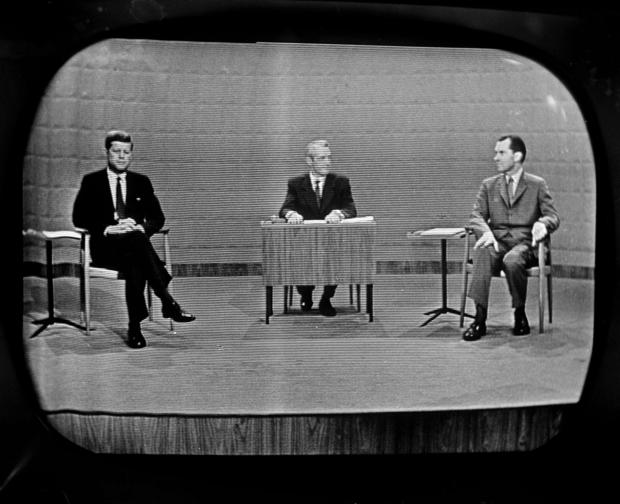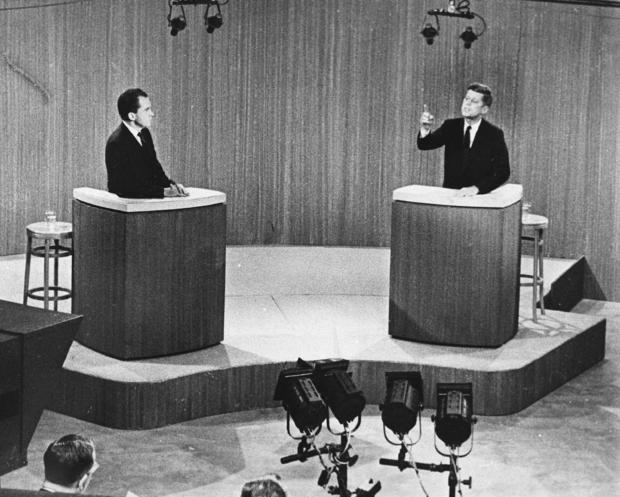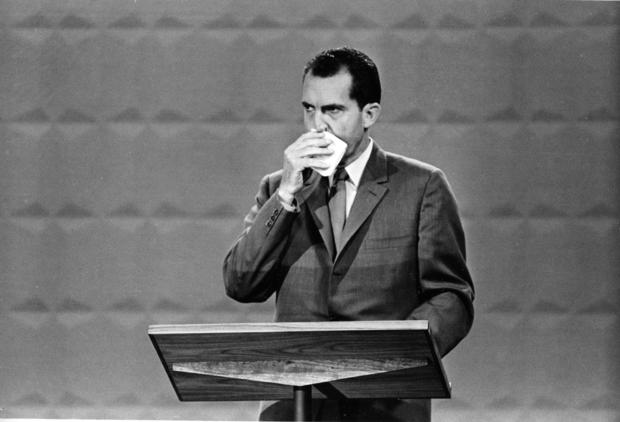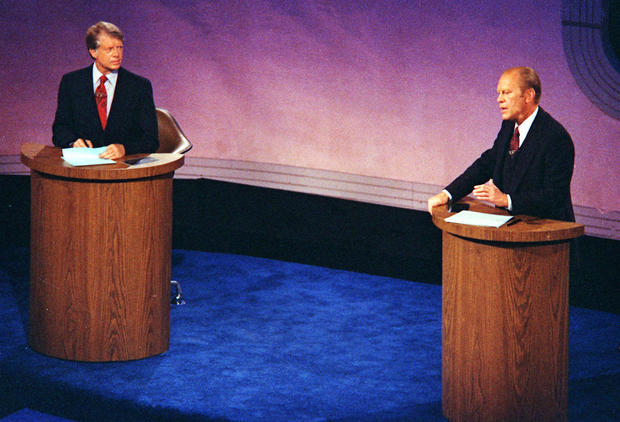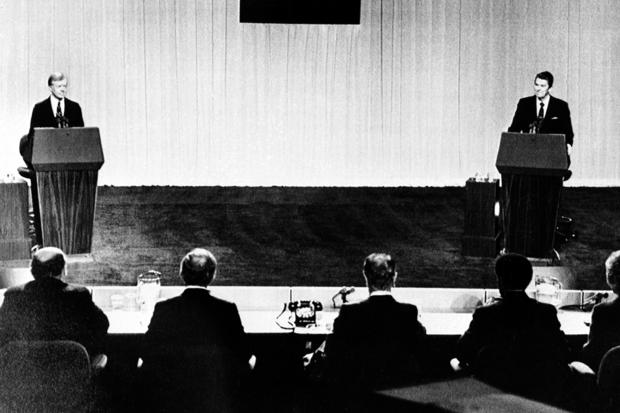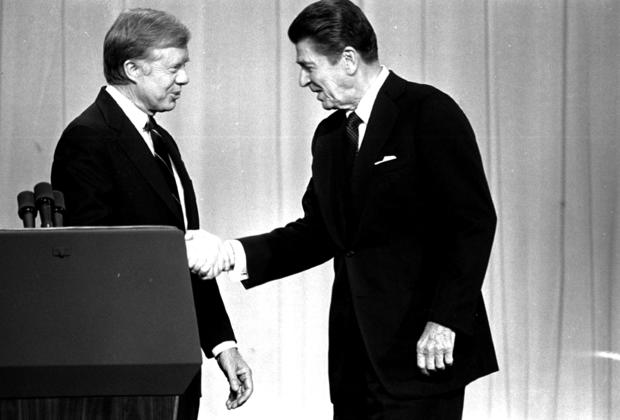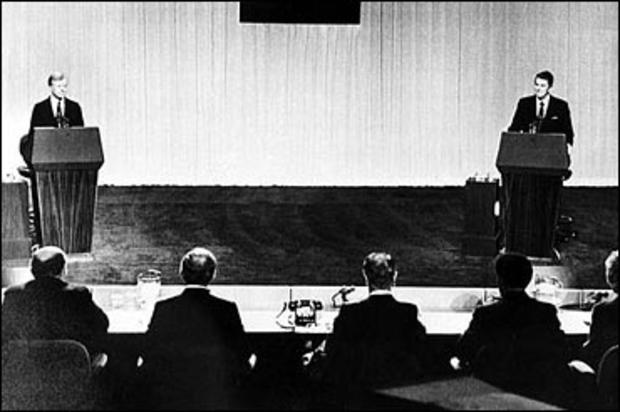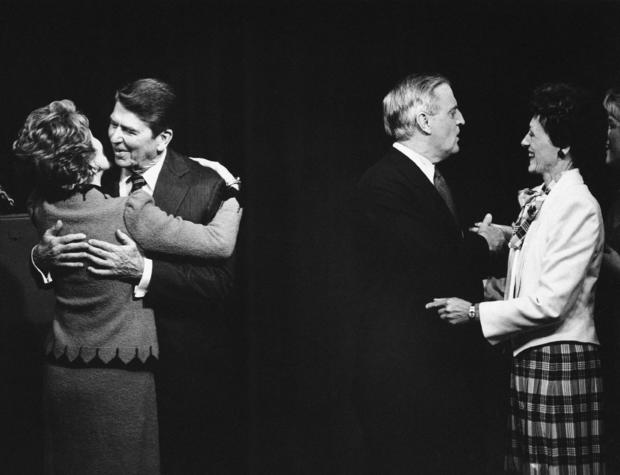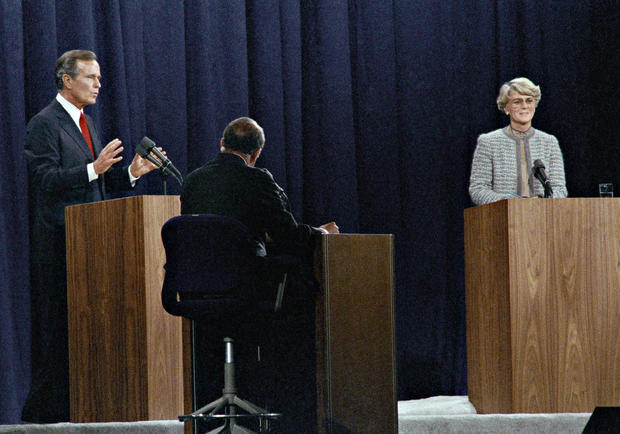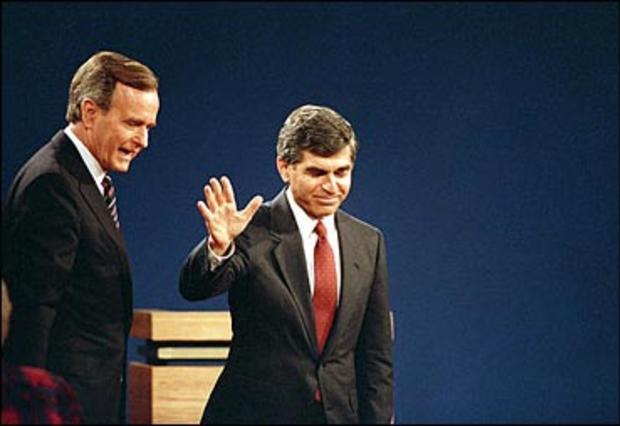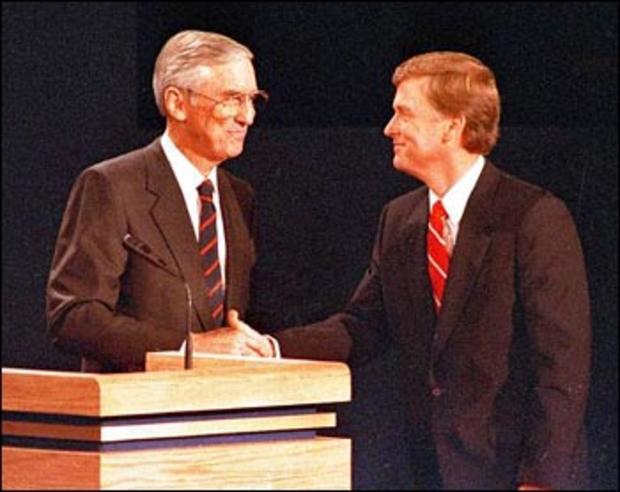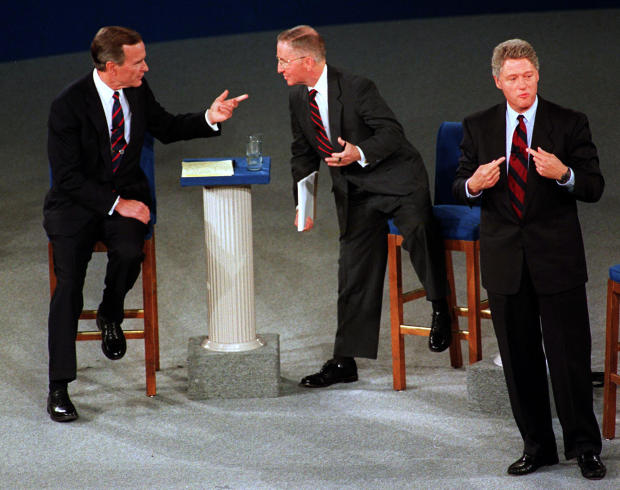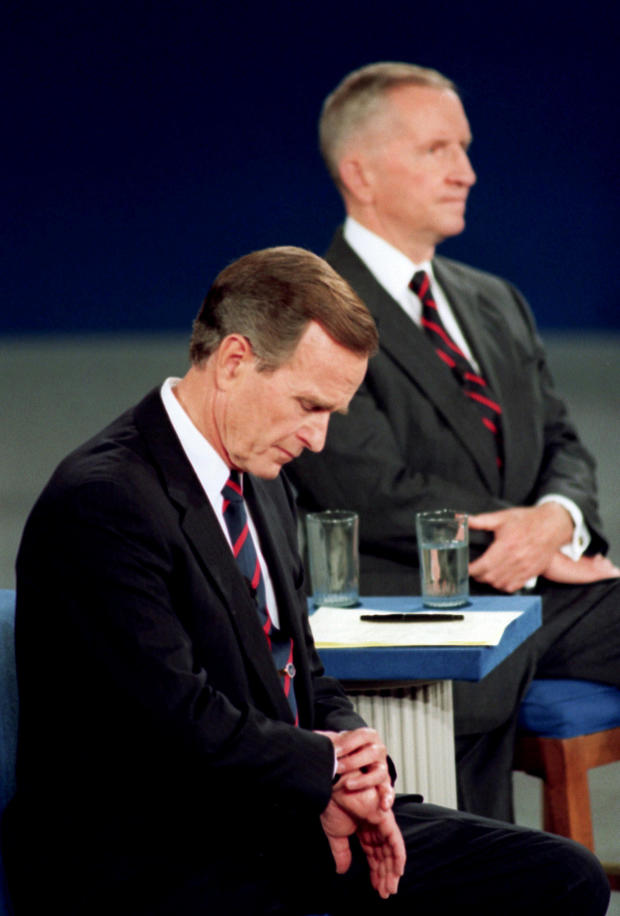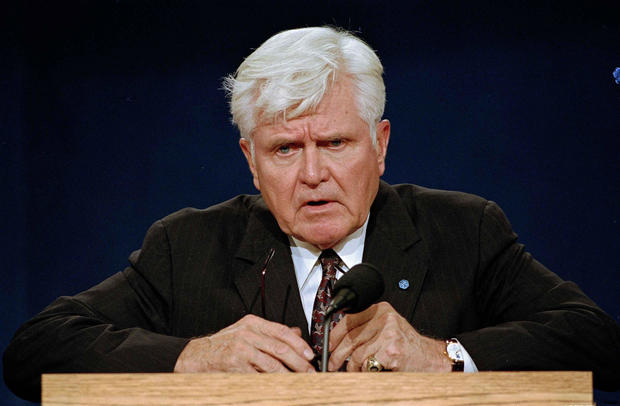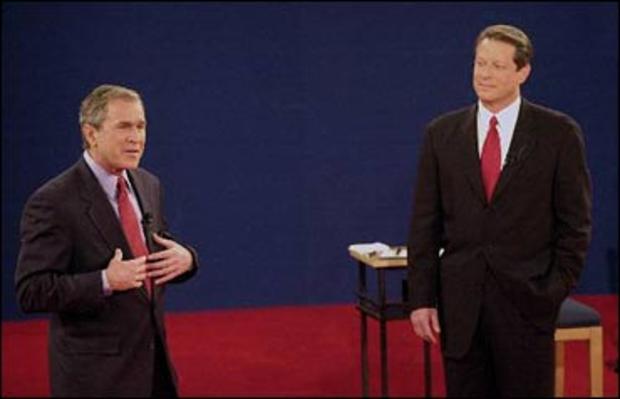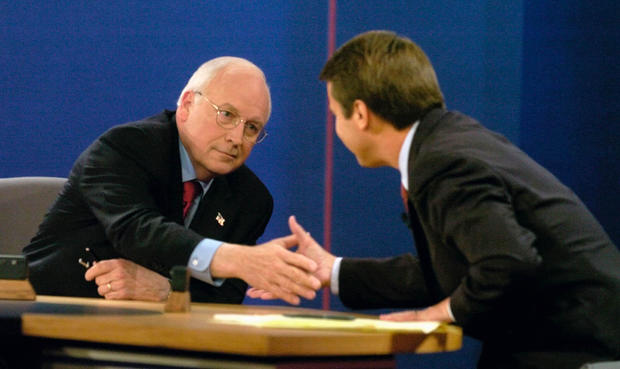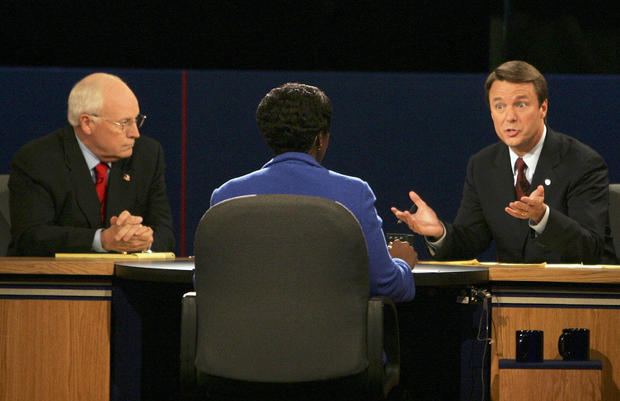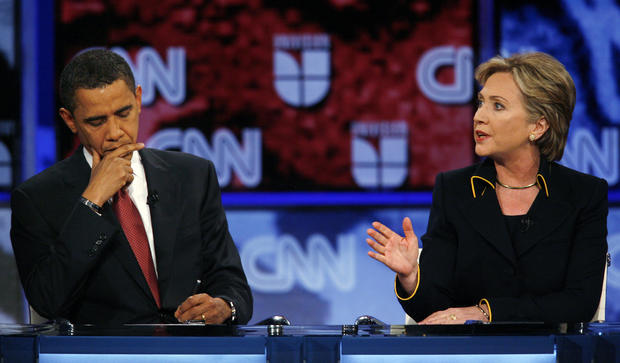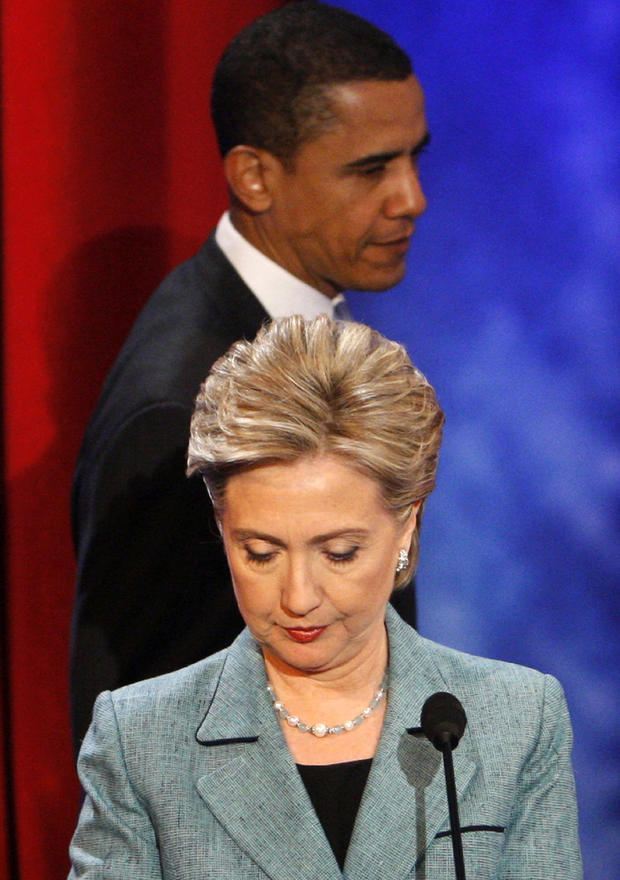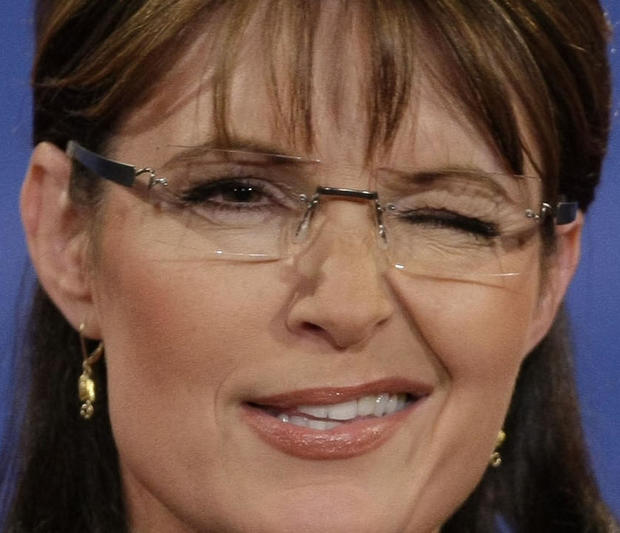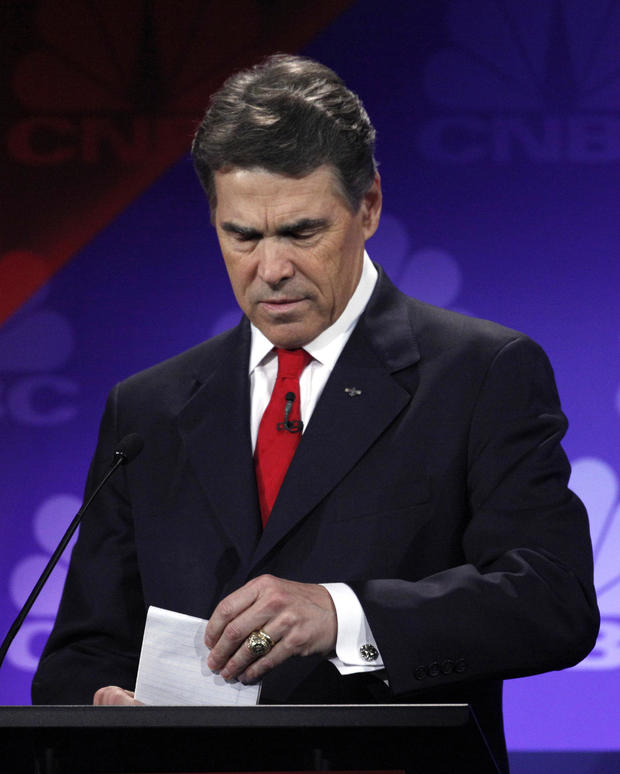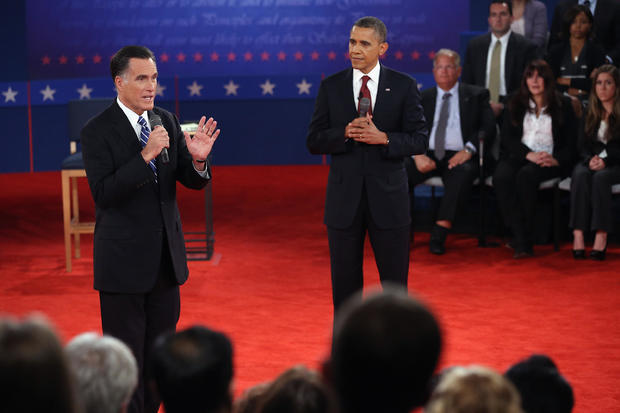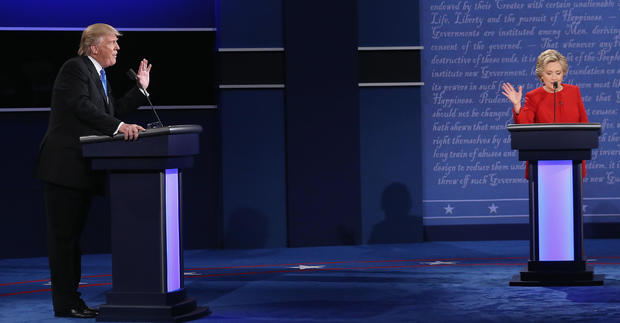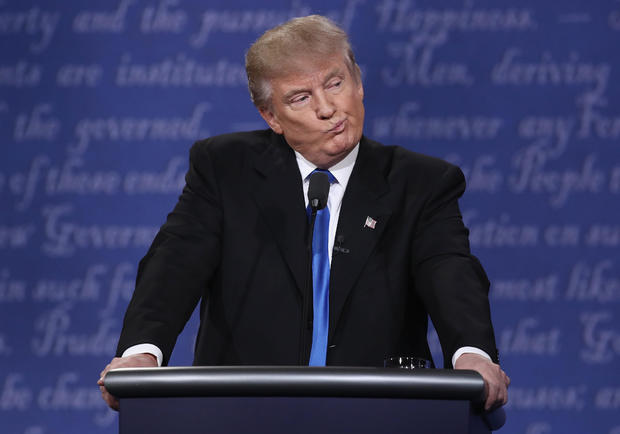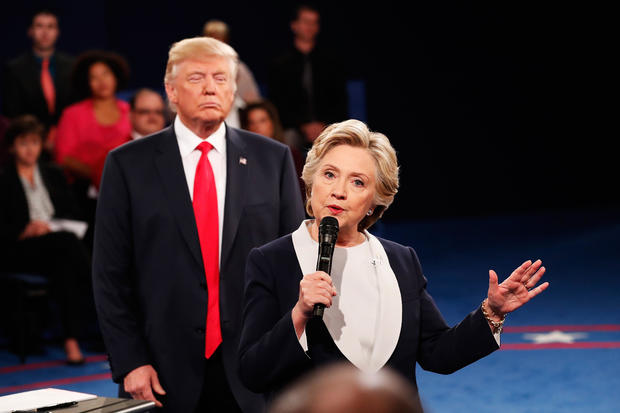Most memorable debate moments
Debates between political candidates, as they vie for the U.S. presidency and vice presidency, can often make or break a campaign. In presidential politics, everybody’s searching for “the moment.” The campaigns don’t know when or how it will come, but they watch for something -- awkward words or an embarrassing image -- that can prove costly to an opponent’s campaign.
The first ever televised presidential debate in 1960 between Democrat presidential candidate Sen. John F. Kennedy and Republican presidential candidate Vice President Richard M. Nixon.
Nixon Kennedy
Kennedy, right, speaks and Nixon listens during their fourth presidential debate, Oct. 21, 1960, in New York City. The Kennedy campaign pushed for the debates, in part because their candidate had far less recognition nationwide than Nixon as the current vice president.
Richard Nixon - 1960
Nixon wipes his face with a handkerchief during the first televised debate in Chicago, Sept. 26, 1960. Television upped the stakes and the pitfalls for the candidates. Nixon had the flu and wore no makeup, a major mistake.
Television lighting clearly showed his five o’clock shadow and drops of sweat on his lip. Nixon’s profuse sweating on stage with cool-as-a-cucumber rival Kennedy proved to be stiff competition in the pantheon of campaign misfires.
Radio listeners said Nixon won but television viewers overwhelmingly picked Kennedy. The debate is credited by some with swinging a close election in favor of the more telegenic Kennedy.
Carter and Ford - 1976
It took 16 years for presidential candidates to agree to a televised debate after Richard Nixon’s disastrous debate with John Kennedy.
Incumbent Republican President Gerald Ford, right, debated Democratic former Georgia Gov. Jimmy Carter in three televised debates in 1976. The audio transmission failed for 27 minutes during the debate, leaving newsman Harry Reasoner scrambling to fill the airwaves as the candidates stood awkwardly waiting.
Reagan Carter
In their debate on Oct. 22, 1976 in Williamsburg, Va., Ford declared inaccurately, “There is no Soviet domination of Eastern Europe and there never will be under a Ford administration.” Carter quickly responded that he would like to see Ford convince Polish, Czech and Hungarian-Americans that their countries weren’t under Soviet rule.
Time magazine called it “the blooper heard round the world.” Ford’s rival said the president had “disgraced our country.”
Ford had been leading in polls before the second debate, and some believe his misquote on Eastern Europe could have begun the slide that cost him the election.
Carter and Reagan - 1980
PRepublican presidential candidate Ronald Reagan, the former California governor, was behind in the polls going into his one and only debate with President Jimmy Carter on Oct. 28, 1980, but had been improving. Some analysts say the Cleveland debate cemented his victory in the election, which was held a week later.
Analysts said President Carter’s remarks about a discussion of the issues with his young daughter Amy, 13, in which he asked her about the most important issues facing the country came off as strange.
Carter and Reagan - 1980
A cheerful Reagan shone in his debate against Carter, scolding him with a gentle “There you go again,” to successfully put down a series of accusations.
Reagan also issued the famous line, “Are you better off then you were four years ago?” It has turned out to be such good line that subsequent challengers have made it de riguer.
Reagan and Mondale - 1984
President Ronald Reagan embraces his wife Nancy at left as Democrat challenger Walter Mondale welcomes his wife Joan to the stage at the conclusion of their second debate in Kansas City on Oct. 21, 1984.
“I will not make age an issue of this campaign. I am not going to exploit, for political purposes, my opponent’s youth and inexperience,” the 73-year-old Reagan answered when asked if he was too old to be president. Even his opponent was amused. Mondale later said on PBS, “That was really the end of my campaign that night, I think.”
Bush and Ferraro - 1984
Congresswoman Geraldine Ferraro, the Democratic vice presidential candidate, made history as the first woman on a national ticket and shared a debate stage with then-Vice President George H.W. Bush in Philadelphia on Oct. 12, 1984.
Bush made the mistake of talking down to Ferraro with his statement, “Let me help you with the difference, Ms. Ferraro, between Iran and the embassy in Lebanon.” Ferraro came back at him with the reply, “I almost resent, Vice President Bush, your patronizing attitude that you have to teach me about foreign policy.” Bush also notably didn’t address Ferraro by her title, referring to her as “Ms. Ferraro” or “Mrs. Ferraro” instead.
Bush compounded the situation, by telling an audience the next day, “I tried to kick a little ass.” Many reporters and those in the public resented Bush’s chauvinistic treatment of Ferraro. Doonesbury cartoonist Gary Trudeau skewered Bush over his “manhood problem. “
Bush and Dukakis - 1988
Republican Vice President George H. W. Bush, left, and Democratic Massachusetts Gov. Michael Dukakis took part in two debates in 1988. In their second debate in Los Angeles, analysts saw Dukakis’ reply to a hypothetical question on whether he’d favor the death penalty for someone who’d raped and murdered his wife as cold and unfeeling. The Democratic candidate’s popularity dropped and Bush went on to win the presidency.
Bentsen and Quayle - 1988
In a quotable moment on Oct. 5, 1988, Sen. Dan Quayle, R-Ind, defended his experience and age (41) by comparing himself with President John F. Kennedy, who was 43 when he became president. Sen. Lloyd Bentsen, D-Texas, responded, “Senator, I served with Jack Kennedy, I knew Jack Kennedy, Jack Kennedy was a friend of mine. Senator, you’re no Jack Kennedy!” A total shutdown moment.
Bush, Perot and Clinton - 1992
President George H. W. Bush, left, talks with Independent candidate Ross Perot, as Democratic candidate Bill Clinton stands aside, at the end of their second presidential debate in Richmond, Va., Oct. 15, 1992.
The “town hall” style presidential debates began as a nerve-racking experiment in live television. Moderator Carole Simpson was so nervous about turning over the microphone to regular folks that she spent days mapping out the presidential candidates and their issues on index cards, just in case.
The debates put President Bush on the defensive against two rivals at once. They also played to Mr. Clinton’s strength as a personable and strong speaker. When Bush attacked Clinton for participating in Anti-Vietnam protests, Clinton responded, “You were wrong to attack my patriotism. I was opposed to the war, but I love my country.”
George H.W. Bush - 1992
While both Clinton and Perot pounded the Bush administration, the image of President Bush checking his watch, apparently eager to leave, left an indelible impression on many voters, Oct. 15, 1992. That gesture would be replayed over and again as evidence that the president was indifferent and out of touch. “I took a huge hit,” Bush said years later in speaking with Journalist Jim Lehrer for a PBS documentary, “Debating our Destiny.”
Admiral James Stockdale - 1992
Admiral James Stockdale, the Independent vice presidential candidate on the ticket with Ross Perot in 1992, put on a very poor performance during his Atlanta debate with then-Sen. Al Gore and incumbent Vice President Dan Quayle.
The former Vietnam War POW started out the debate asking, “Who am I? Why am I here?” Meant as a funny line, it made people laugh, but not in a good way. Stockdale looked unprepared and that was only exacerbated by asking moderator Hal Bruno of ABC News to repeat a question because he hadn’t turned his hearing aid on.
Bush and Gore - 2000
Republican presidential candidate Texas Gov. George W. Bush, left, proved he was smart and personable, exceeding expectations of many voters, who had heard jokes about his intelligence, in his debates with Democratic presidential candidate Vice President Al Gore in 2000. Gore, however, lived up to stereotypes, appearing somewhat stiff. His frequent heavy sighs brought comments and derision. Body language proved to be Gore’s downfall.
Bush made points with a good zinger about Gore too: “I’m beginning to think not only did he invent the internet, but he invented the calculator. It’s fuzzy math.”
Cheney and Edwards - 2004
Vice President Dick Cheney, left, met Senator and Democratic vice presidential candidate John Edwards in Cleveland on Oct. 5, 2004. “Your hometown newspaper has taken to calling you ‘Senator Gone,” Cheney started out with. “The first time I ever met you was when you walked on stage tonight.”
The two had actually met previously at a 2001 National Prayer Breakfast and on two other occasions according to AP. But Cheney made his point about Edwards’ frequent senate absences.
Cheney and Edwards - 2004
There was a particularly awkward moment in 2004 when Cheney didn’t mention his lesbian daughter in answering a question about Republican support for a constitutional gay marriage ban. Edwards dove right in, however, stating, “I think the vice president and his wife love their daughter,” adding, “And you can’t have anything but respect for the fact that they’re willing to talk about the fact that they have a gay daughter, the fact that they embrace her. It’s a wonderful thing.”
The Cheneys were reportedly furious that Edwards brought up their daughter. On stage, however, the vice president merely said, “let me simply thank the senator for the kind words he said about my family and daughter. I appreciate that very much.” Moderator Gwen Ifill followed up with “That’s it?”
Clinton and Obama - 2008
When the debate between Democratic hopefuls, Sen. Sen. Barack Obama and Sen. Hillary Clinton, turned to the question of similarities in passages between some of Obama’s speeches and those of Massachusetts Governor Deval Patrick, Clinton’s attack failed. The audience booed when she said, “Lifting whole passages from someone else’s speeches is not change you can believe in, it’s change you can Xerox,” on Feb. 21, 2008 in Austin.
Clinton and Obama - 2008
In their next debate in 2008, the most memorable line that came out of the presidential primary debates between Clinton and Obama was when Obama declared, “You’re likable enough.” It wasn’t even his turn to speak since the moderator had asked Clinton herself about her appeal. At the time, it may have helped Clinton defeat Obama in the New Hampshire primary. The normally eloquent and diplomatic Obama still hasn’t heard the last of the backlash on that comment.
Sarah Palin - 2008
The 2008 debate between Republican vice presidential candidate Alaska Gov. Sarah Palin and Democratic vice presidential candidate Sen. Joe Biden was the first since the one with Geraldine Ferraro that included a woman candidate. According to Nielsen, it was the most watched vice-presidential debate in history with 70 million viewers.
Palin’s folksy style was on full display. She started out by asking Biden, “Can I call you Joe?” and ambiguously winked at least six times at her audience (to mixed reviews). Her line, “Say it ain’t so, Joe,” became fixed in debate lore. Biden had held back so as not to come off a bully and Palin came off better than expected.
Rick Perry - 2011
Then-Republican hopeful and one-time front runner Texas Gov. Rick Perry helped torpedo his presidential ambitions with this “oops” moment.
When asked what federal agencies he’d eliminate as president he said, “I would do away with Education...ah...the...ah...Commerce and let’s see. I can’t. The third one. I can’t. I’m sorry. Oops.”
The Washington Post called it Perry’s “48-second brain freeze.”
Romney and Obama - 2012
Republican presidential candidate Mitt Romney (L) caught the electorate’s attention in a negative way in his second debate with President Barack Obama. Romney described asking women’s groups to help him find female candidates for his cabinet as governor of Massachusetts. His line, “They brought up whole binders full of women!” spawned internet memes and a Binders Full of Women Facebook page with more than 270,000 likes. Women’s issues were solidly in the spotlight as a result and Democrats capitalized on it to Romney’s detriment.
Trump and Clinton - 2016
The first debate on Sept. 26, 2016. between Republican presidential nominee Donald Trump and Democratic presidential nominee former Sec. of State Hillary Clinton was highly anticipated.
According to USA Today, Trump interrupted Clinton at least 22 times in 26 minutes. That approach to the first female presidential party hurt Trump. The interruptions became a “thing” on Twitter with many commenting negatively on “mansplaining.”
When Trump was asked by debate moderator NBC’s Lester Holt to explain what he meant by Clinton not having a “presidential look” Trump stated,”She doesn’t have the look, she doesn’t have the stamina. I said she doesn’t have the stamina and I don’t believe she does have the stamina. To be president of this country, you need tremendous stamina.” This was taken as reference to Clinton’s health, but had an underlying tint of sexism too.
Clinton quipped: “As soon as he travels to 112 countries and negotiates a peace deal, a cease-fire, a release of dissident, an opening of new opportunities and nations around the world, or even spends 11 hours testifying in front of a congressional committee, he can talk about stamina.”
Donald Trump's body language
In addition to the aggressive interruptions, Trump’s body language, facial expressions and constant sniffling drew significant attention and comment.
CBS “Late Show” host Stephen Colbert theorized, “Trump sounded like he was fighting off a cold. With cocaine!” He wasn’t the only one who joked about the sniffles. Former presidential candidate and Democratic National Committee Chairman Howard Dean tweeted, “Notice Trump sniffing all the time. Coke user?” It particularly resonated because of Trump’s repeated references to Clinton’s health, who recently suffered from pneumonia. Trump blamed his sniffles on a bad microphone.
Modern day candidates and politicians contend now not just with media scrutiny, but with the instant reaction world of tweets, memes and gifs that have the power to go viral and create lasting impressions. Twitter confirmed this was the most tweeted debate ever. @trumpsniff got its own Twitter account overnight.
Clinton-Trump debate
The second of three 2016 debates between Democratic presidential nominee former Secretary of State Hillary Clinton and Republican presidential nominee Donald Trump on October 9, 2016 in St Louis, Missouri was notable for it’s extremely negative tone and hostility. The two candidates, in a breach of protocol, failed to shake hands at the onset.
Trump brushed off his lewd comments about women, in a recently aired video, as “locker-room talk.” He had earlier tried to deflect criticism resulting from the video with a pre-debate event attended by several women who have accused former President Bill Clinton of sexual misconduct. Much social media criticism revolved around Trump’s perceived “stalking” of Clinton on stage while political commentators were taken aback by his statement, “If I were president, you’d be in jail.”
